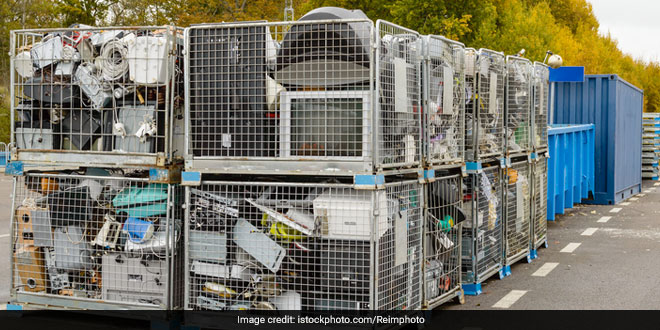New Delhi: Environment Minister Harsh Vardhan said on Saturday that a plant to convert plastic waste into bio-diesel will soon be made operational at the Indian Institute of Petroleum (IIP) in Dehradun. He was speaking at the International E-Waste Day event organised by the International Finance Corporation (IFC). “The plant has been set up at Dehradun and it will be operational by January end. The facility, which will be run on the pilot basis, is capable of converting plastic waste into bio-diesel. The model will then be replicated across the country,” Mr. Vardhan said.
Also Read: Plan How To Record Nature And Quantity Of E-Waste In Two Months: Delhi High Court Tells Centre
The plant has the capacity to convert one tonne of plastic waste into 800 litres biofuel which will be of highest quality and it can be used in any diesel automotive vehicle, according to a government official. Mr. Vardhan said the whole country was concerned about the problem of e-waste and the government had amended the existing rules to ensure better management of e-waste and bio-medical waste through revised targets.
Also Read: E-Waste On The Rise: India Is Now One Of The Top Five E-Waste Producers In The World: Report
As per the Global E-Waste Monitor 2017 Report of United National University, the world generation of e-waste in 2016 was 44.7 million metric tonnes and the annual generation of e-waste in India was 2 million metric tonnes.
Therefore, the contribution of India to the worldwide generation of e-waste is 4.47 per cent. We are neck deep into the problem and we have already have got the rules amended in 2018 based on discussions with the industry and other stakeholders. On behalf of our prime minister, we can promise to the whole world that like many other fields in the environment, we will certainly try to do our best on e-waste front, Environment Minister Harsh Vardhan said.
#एसोचैम के अध्ययन के मुताबिक #पर्यावरण व स्वास्थ्य के लिए हानिकारक #ई_कचरा से प्रभावित लोगों में कैंसर होने की संभावना होती है।#ग्रीनगुड_डीड्स के जरिये समाज को जागरूक किये जाने की जरूरत है।आज पर्यावरण को बचाने के लिए एक मजबूत रिसायकलिंग सेटअप स्थापित करने की जरूरत है। @moefcc pic.twitter.com/sy9VhKHoii
— Dr Harsh Vardhan (@drharshvardhan) October 13, 2018
Also Read: 50 Per Cent Indians May Be Hoarding E-Waste For Up To Five Years, Reveals A Survey
He also urged those present at the event to build a social movement around ‘Green Good Deeds’- an initiative of the Environment Ministry and make it successful like the ‘Pulse Polio’ campaign. The ministry has drawn up a list of over 500 deeds to motivate and involve the masses in environment protection. It mainly focuses on altering the behaviour to make it nature-friendly, he said.
On the occasion, Japan’s Ambassador to India Kenji Hiramatsu said, I congratulate IFC on the successful implementation of its India E-waste Advisory Project, and I am pleased to inform that Government of Japan has been supporting this project through the Comprehensive Japan Trust Fund since 2014. I hope that this project would continue to contribute to the implementation of the E-waste policy in India.
He also spoke about the importance of promoting a circular economy to achieve the goal of a sustainable society. E-waste is the world’s fastest growing waste stream and India is the fourth largest e-waste producer. At present around 95 per cent of the waste is processed by the informal sector, using practices harmful to their health and the environment. Half of the e-waste generated globally is from personal devices such as computers, screens, smartphones, tablets and televisions, with the remainder being larger household appliances and heating and cooling equipments.
Also Read: E-Waste On The Rise: India Is Now One Of The Top Five E-Waste Producers In The World: Report
NDTV – Dettol Banega Swachh India campaign lends support to the Government of India’s Swachh Bharat Mission (SBM). Helmed by Campaign Ambassador Amitabh Bachchan, the campaign aims to spread awareness about hygiene and sanitation, the importance of building toilets and making India open defecation free (ODF) by October 2019, a target set by Prime Minister Narendra Modi, when he launched Swachh Bharat Abhiyan in 2014. Over the years, the campaign has widened its scope to cover issues like air pollution, waste management, plastic ban, manual scavenging and menstrual hygiene. The campaign has also focused extensively on marine pollution, clean Ganga Project and rejuvenation of Yamuna, two of India’s major river bodies




























